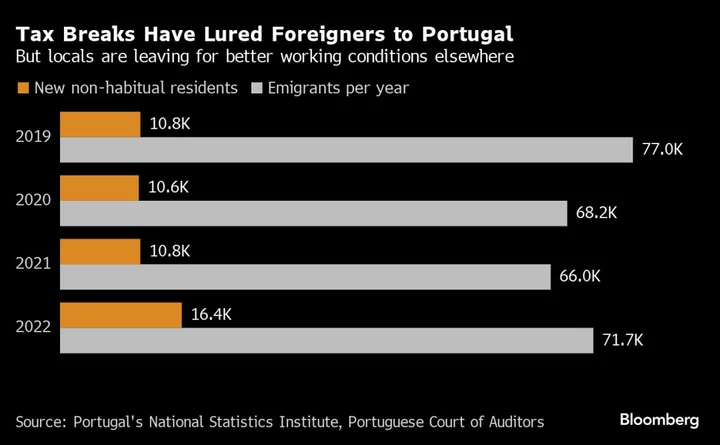For a company that operates from what is regularly dubbed the digital nomad capital of Europe, Banco Comercial Portugues SA is having a surprisingly difficult time recruiting young people with numeracy and tech skills.
Portugal’s biggest publicly traded lender needs engineers, mathematicians and digital marketers to help build out its internet banking platform, but a brain drain in the decade since the country’s sovereign debt crisis has left the country short of young talent. Every year almost 40% of the nation’s graduates leave in search of better work and living conditions elsewhere, according to Business Roundtable Portugal, a group of the country’s biggest private companies.
“It’s not just hard to recruit new employees, there’s also difficulty in retaining people,” Banco Comercial Chairman Nuno Amado said in an interview in Lisbon. “It’s very hard to hire for most areas related to digital.” A spokesperson said separately that the company is recruiting about 100 roles a year in areas including technology and data science.
The irony is that the Portuguese government has been doing a good job in recent years of attracting people from abroad to live in the country, but its policies may have exacerbated the hiring problems. A 20% flat tax for non-habitual residents — combined with the nation’s warm climate and attractive coastline — has made the country a hotspot for remote workers and wealthy retirees, who have helped push up housing costs, making it unattractive for young graduates to stick around. That tax break, given for 10 years to people who hadn’t been resident in the country five years prior, was recently scrapped in a bid to cool property prices.Although Portugal’s case is extreme, it serves as a warning for other European nations as they battle to retain young talent amid a surge in living costs. Residential housing prices have skyrocketed across the continent’s biggest cities in recent months, exacerbated in many places by an influx of remote workers and government policies aimed at drawing in wealthy individuals.
Employers say it’s getting to a point where they’re becoming critically short of entry-level recruits. Vasco de Mello, chairman of the Jose de Mello Group, a family-owned holding company that runs Portugal’s biggest network of private hospitals, called the situation “demographic hell” in recent comments to Bloomberg, while Antonio Amorim, chief executive of Corticeira Amorim SA, the world’s biggest producer of cork products, warned at a conference in Lisbon earlier this year that companies will have to move elsewhere if the youth drain continues.
Portugal has the eighth highest emigration rate as a proportion of population in the world, with about 25% of its population living abroad, data compiled by the Emigration Observatory in Lisbon shows. Rui Pena Pires, who heads the group, estimates that a person with qualifications is two or three times more likely to leave Portugal than someone without any skills. Most qualified workers go to the UK, Ireland, Belgium and other northern European countries, he said.“Some of the best students from the top universities in Portugal aren’t interested in job opportunities here,” said Filipa Leite de Castro, a partner at Argo, a Lisbon-based recruitment company. Earlier this year, one of the country’s biggest banks hired Argo to find a data engineer with less than three years of work experience. It took six months to find a suitable candidate, Leite de Castro says.A major problem is competition from bigger companies based elsewhere in Europe offering higher salaries, clearer career paths and often lower taxes. Portugal operates a progressive tax regime from 14.5% to 48%, but since average salaries are among the lowest in western Europe, skilled workers tend to face steeper tax increases than their counterparts in wealthier parts of the continent. Banco Comercial’s Amado says that when companies raise salaries to try to compete, their workers end up getting stung with a tax hike that wipes out a large chunk of the pay increase.
“It’s extremely difficult to return to Portugal, unfortunately. I’ve tried,” said David Pereira de Castro, 31, a PhD fellow at Copenhagen Business School and chairman of the SPOT Nordic Association, which represents Portuguese researchers and professionals in Nordic countries. The number of Portuguese in Denmark has doubled to 6,000 in the past four years, according to Pereira de Castro. Most are young and qualified, and many work in science-related jobs.Read more: Runaway Property Costs Push Portugal to End Golden Era of VisasIn Copenhagen, Pereira de Castro earns about €4,200 ($4,400) a month before tax and says he’d be making about half that in Lisbon, with similar outlays for housing. That means he has more left over at the end of each month to put into savings. “I’ve been investing in the place I’m going to move to in Portugal when I retire,” he said.
The government announced measures earlier this month that it hopes will encourage young people with higher education to stay in the country, including increasing income tax breaks on the first five years of graduates’ careers and reimbursing university fees of those who begin their careers in Portugal. Both are due to come into effect next year. Other recent proposals include free childcare, support to pay rent and raising entry-level salaries for public sector workers.
Bank of Portugal Governor Mario Centeno argued in an article published on the central bank’s website in September that the country is not “destined for emigration” and that better-paid jobs are being created. Wages are set to increase 16% by the end of 2025, according to central bank forecasts, and youth unemployment, which surged to about 40% during the euro zone crisis in 2012, has dropped to 17%. Some 500,000 new positions were added in the country between 2015 and 2022, Finance Minister Fernando Medina said in July.
Current students aren’t optimistic that much will have changed by the time they finish university. David Rodrigues, an undergraduate studying aerospace engineering at the University of Lisbon’s prestigious school of engineering and technology, says more than half of his classmates, including himself, plan to look for work elsewhere when they graduate. “If you want to grow you need to leave,” Rodrigues said.
Catarina Pescada, 18, a first-year undergraduate student at the ISEG Lisbon School of Economics and Management says there’s no incentive to stay because there are no well-paid jobs in Portugal.
“We just need to pack our bags and leave, hoping to save enough money to return to Portugal when we retire,” Pescada said.
--With assistance from Chiara Albanese.









